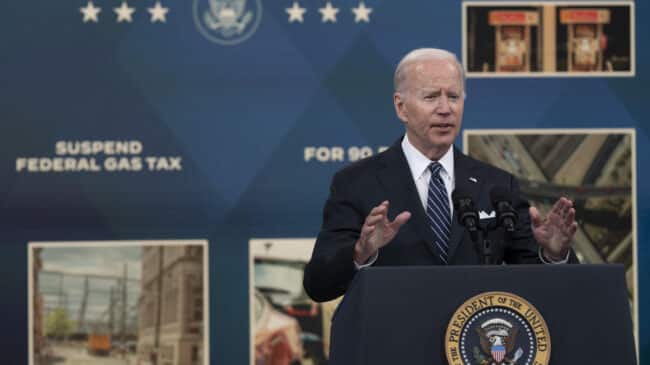With rising food and energy prices driving inflation to levels not seen in 40 years, President Joe Biden is proposing a federal gas tax holiday. Unfortunately, the suggested fuel tax holiday is unlikely to reduce prices at the pump but could blow a hole in the federal Highway Trust Fund and further politicize transportation funding.
With several states, including Georgia, Florida, and New York, passing bills to suspend state gas taxes, President Biden recently called for other states to do the same and began pushing for a three-month holiday from federal motor fuel taxes. A White House aide told Politico, “A federal gas tax suspension alone won’t fix the problem we face. But it will provide families a little breathing room.”
Fortunately, the idea faces bipartisan opposition in Congress. Some Senate Republicans, including Senate Minority Leader Mitch McConnell (R, KY), have called it a fiscally irresponsible political stunt.
The president’s political party is also loudly opposed to suspending the gas tax. House Speaker Nancy Pelosi (D, CA) questioned whether the policy would lead to savings at the pump. Transportation and Infrastructure Committee Chair Peter DeFazio (D, OR) was more direct, saying, “Suspending the federal gas tax will not provide meaningful relief at the pump for American families, but it will blow a multi-billion-dollar hole in the Highway Trust Fund, putting funding for future infrastructure projects at risk.”
“Barack Obama was right. A gas tax holiday was a bad idea in 2008 and it’s a bad idea today,” Sen. Bernie Sanders (D, VT) tweeted.
Sen. Sanders is referring to then-Sen. Barack Obama’s opposition to suspending the gas tax when Republican presidential candidate Sen. John McCain proposed suspending the gas tax from Memorial Day to Labor Day during the 2008 presidential campaign. At the time, then-Sen. Obama said:
“We’re arguing over a gimmick that would save you half a tank of gas over the course of the entire summer so that everyone in Washington can pat themselves on the back and say they did something. Well, let me tell you, this isn’t an idea designed to get you through the summer, it’s designed to get them through an election.”
Obama was right back then and he is right now. There is no certainty that significant savings would be passed along to customers. A recent Penn Wharton study found that President Biden’s gas tax suspension proposal would have relatively minor financial impacts on typical households:
“We estimate that suspending the federal excise tax on gasoline from July to September this year would lower average gasoline spending per capita by between $4.79 and $14.31 over three months, depending on geographic location and modeling assumptions, and lower federal tax revenue by about $6 billion during that period.”
Temporarily suspending the motor fuel tax would blow a massive hole in a significant revenue source for the recently passed Infrastructure Investment and Jobs Act (IIJA). Congress and the White House increased transportation spending by $415 billion over the 10-year budget window. The Highway Trust Fund, used to fund federally-supported highway and transit projects, is already strained, and a gas tax holiday would worsen an already bad situation.
The fuel tax suspension would also weaken the users-pay/users-benefit principle of highway funding. For more than 50 years, federal highway funding has been based on the concept of motorists who use roads paying to build and maintain those roads in proportion to how much they drive. Suspending the gas tax and presumably making up the difference by shifting money from general taxes or adding to the deficit means Americans who don’t drive or drive less than others are forced to subsidize the roads other drivers use.
If the Biden administration is looking to lower gas prices, it has more promising policy options. In the near term, it could waive ethanol blending mandates and relax economic sanctions on oil-producing countries. Over the long term, it could encourage more domestic oil production and the construction of new refineries.
Suspending the fuel tax is also a lot easier than reinstating it. What politician wants to be on record supporting a tax increase later this year if inflation and prices are still rising?
Politicians consistently emphasize the need to properly build and maintain roads and infrastructure and often claim that current transportation funding is inadequate. Suspending the federal gas tax is a bad idea that would negatively affect the country’s roadway system without significantly lowering gas prices or helping drivers.

